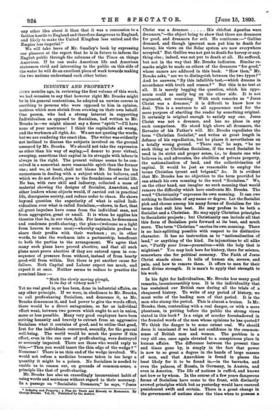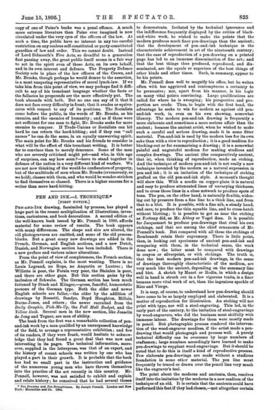INDUSTRY AND PROPERTY.*
,;0]IE months ago, in reviewing the first volume of this work, we had occasion to say that however right Mr. Brooks might be in his general contentions, he adopted an unwise course in ascribing to persons who were opposed to him in opinion, motives which men shrink from avowing on their own behalf. One person, who had a strong interest in supporting Individualism as opposed to Socialism, had written to Mr. Brooks in—we might almost say a fierce " spirit "—I'll have none of your nostrums ! I think the capitalists all wrong, and the workmen all right, &c. We are not quoting the words, bat we are rendering the exact idea. The writer was evidently not inclined to discuss the subjects involved on the ground assumed by Mr. Brooks. We should not take the expression as other than his way of saying,—I demur to your virtual, sweeping, assertions that capital in its struggle with labour is always in the right. The present volume seems to be con- ceived in a somewhat more reasonable spirit than the former one ; and we, at least, shall not blame Mr. Brooks for his earnestness in dealing with a subject which he believes, and which we do not doubt, goes to the foundations of social life.
He has, with rare skill and industry, collected a mass of material showing the designs of Socialist, Anarchist, and other leaders whose objects would, if carried out in practical life, disorganise society, and reduce order to chaos. He shows beyond question the superiority of what is called Indi- vidualism over what is called Socialism,—shows, in fact, that all great impulses have come from the individual man, not from aggregates, great or small. It is when he applies his theories that he, in our view, fails. For instance, he denounces and condemns profit-sharing; the plan—(welcome as a light from heaven to some men)—whereby capitalists profess to share their profits with their workmen ; or, in other words, to take the workmen into a partnership, beneficent to both the parties to the arrangement. We agree that many such plans have proved abortive, and that all such plans must prove abortive if they are entered upon in con- sequence of pressure from without, instead of from hearty good-will from within. But there is yet another cause for failure. Both Capital and Labour expect too much, and expect it at once. Neither seems to reduce to practice the prescient lines :—
" Mark the slowly moving plough, Is its day of victory now ? "
Yet no real good is, or has been, done in industrial affairs, on any other principle. If we were, in obedience to Mr. Brooks, to call profit-sharing Socialism, and denounce it, as Mr. Brooks denounces it, and had power to give the words effect, there would be a direct antagonism, so far as individual effort went, between two powers which ought to act in union, more or less possible. Many very good employers have been striving honestly and bravely to extract from an aggressive Socialism what it contains of good, and to utilise that good, first for the individuals concerned, secondly, for the general well-being. The world would be much the poorer if this effort, even in the one case of profit-sharing, were destroyed or seriously impaired. There are those who would reply to this,—" Then you would insert the thin edge of the wedge ? " Nonsense ! There is no thin end of the wedge involved. We would not refuse a medicine because taken in too large a quantity it might be a poison. No Socialism is needed to enable us to reason out, on grounds of common-sense, a principle like that of profit-sharing.
Mr. Brooks has also an exceedingly inconvenient habit of using words and sentences without regard to their accuracy. In a passage on " Socialistic Dreamers," he says, " Jesus
• Industry and Property a Phis. for Truth and Honest?? tin Economics. By George Brooks. Vol. U. Published by the Lather.
Christ was a dreamer His chiefest Apostles were
dreamers,"—the object being to show that there are dreamers for good, and dreamers for evil. He continues :—" Galileo dreamed, and though ignorant men put him to death for heresy, his views on the Solar system are now everywhere accepted." But Galileo was not put to death for heresy or any- thing else ; indeed, was not put to death at all. He suffered, but not in the way that Mr. Brooks indicates. Similar re- marks might be made on others of the dreamers "for good," whose names are adduced in this book. " How then," Mr. Brooks asks, " are we to distinguish between the two types ? " And he answers, "By this infallible test,—which dreams in accordance with truth and reason ? " But this is no test at all. It is merely begging the question, which his oppo- nents could as easily beg on the other side. It is not argument, not reasoning. With such remarks as " Jesus Christ was a dreamer," it is difficult to know how to deal. This is a sentence to all appearance used for the mere purpose of startling the reader by something original. It certainly is original enough to satisfy any one. Jesus Christ was not a dreamer, and has no place in any such comparison. He stood high above all dreamers, the Revealer of his Father's will. Mr. Brooks repudiates the term " Christian Socialist," and writes at great length in defence of his repudiation, but be places it nevertheless on a totally wrong ground. " There can," he says, " be no such thing as Christian Socialism, if the word Socialist be used in its strict and proper sense, i.e., to denote one who believes in, and advocates, the abolition of private property, the nationalisation of land, and the collectivisation of capital. It would be just as reasonable to employ the terms Christian tyrant and brigand," &c. It is evident that Mr. Brooks has no objection to the term provided he can attach his own meaning to the word "Socialism." We, on the other hand, can imagine no such meaning that would remove the difficulty which here confronts Mr. Brooks. The word " Christianity " expresses its own meaning. It can owe nothing to Socialism of any name or degree. Let the Socialist pick and choose among his many forms of Socialism for the terms that snit him best. He may profess to be both a Socialist and a Christian. He may apply Christian principles to Socialistic projects ; but Christianity can include all that this form of Socialism puts forward at its best, and much more. The term " Christian " carries its own meaning. There is no hair-splitting possible with respect to its distinctive character. It has no instruction as to "nationalisation of land," or anything of the kind. Its injunctions to all alike are, "Purify your lives—yourselves----with the help that is mightiest." You may look here for history, there for science, somewhere else for political economy. The Faith of Jesus Christ stands alone. It tells of human sin, sorrow, and pain, and how to remove them. It offers to men for their need divine strength. It is man's to apply that strength to his work.
In his fight for Individualism, Mr. Brooks has many good remarks, incontrovertibly tree. It is the individuality that has sustained our British race during all the trials of a chequered history. To write of any period of history, we must write of the leading men of that period. It is the men who stamp the period. This is almost a truism. Is Mr. Brooks, then, contending with a real danger, or with a mere phantasm, in putting before the public the strong views stated in this book P Is a reign of murder foreshadowed in the frenzied words of the men whose opinions he has quoted? We think the danger is to some extent real. We should deem it imminent if we had not confidence in the common- sense of British men and women. The problem is a very old one, once again elevated to a conspicuous place in human affairs. The difference between the present time and times gone by, is simply in the fact that power is now to so great a degree in the hands of large masses of men, and that Anarchism is found in places the least likely for it to be found in,—in the barracks, and even the palaces, of Russia, in Germany, in Austria, and even in America. The life of nations is ruffled, and knows not how or by whom. In the course of a few years dangerous forms of Socialism have come to the front, with distinctly avowed principles which but as yesterday would have ensured punishment swift and certain. There is a great change in the government of nations since the time when to possess a
copy of one of Paine's books was a penal offence. A much more extreme literature than Paine ever imagined is now circulated under the very eyes of the officers of the law. At such a time, the public have no interest in any too careful restriction on any zealous self-constituted or party-constituted guardian of law and order. This we cannot doubt. Instead of Lord Sidmouth's Five Acts, so dreadful to a generation fast passing away, the great public itself seems in a fair way to act in the spirit even of those Acts, on its own behalf, and in its own interest and defence. The Property Defence Society acts in place of the law officers of the Crown, and Mr. Brooks, though perhaps he would demur to the assertion, is a most unsparing representative of moral lynch-law. If we take him from this point of view, we may perhaps find it diffi- cult to say of his trenchant language whether the facts or the fallacies he propounds are the more effectively put. The book abounds with both. But no one can say of it that it does not face every difficulty in front; that it evades or equivo- cates with respect to any of its positions. The Socialists come before the public, in the words of Mr. Brooks, as his enemies, and the enemies of humanity ; and as if these were not sufficient for one man to fight, Mr. Brooks seeks for more enemies to conquer. If Trade-Unions or Socialists can hit hard he can return the hard-hitting ; and if they can " call names" he can do the same, in an equally unswerving spirit. The main point for Mr. Brooks and his friends to consider is what will be the effect of this trenchant writing, It is better far to convince than to merely denounce. Some of the men who are severely criticised might yet—and who, in this age of surprises, can say how soon P—have to stand together in defence of the nation in a very different kind of warfare. We are not now thinking of the would-be confiscators of property, but of the multitude of men whom Mr. Brooks (erroneously, as we hold), classes with them, and who would be wonder-stricken to find themselves so classed. There is a higher success for a writer than mere hard-hitting.



































 Previous page
Previous page